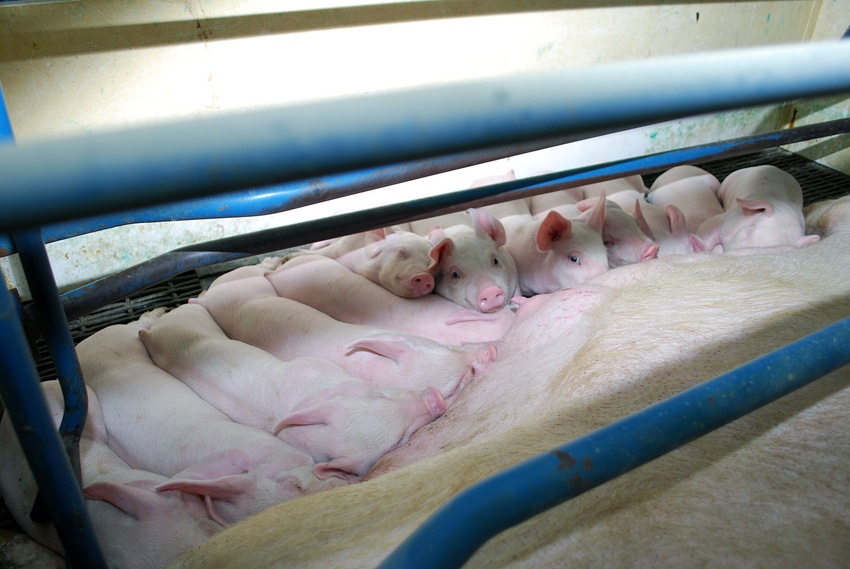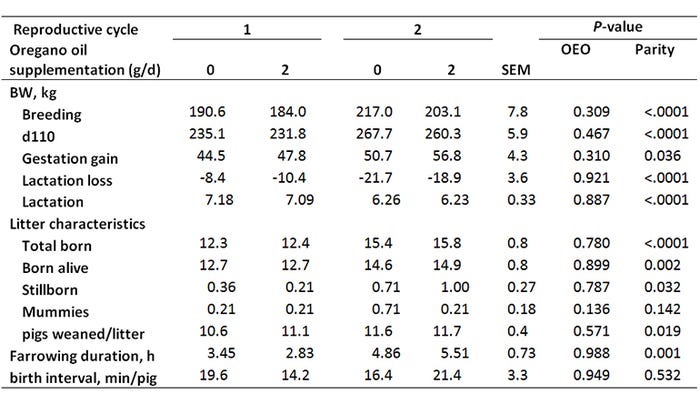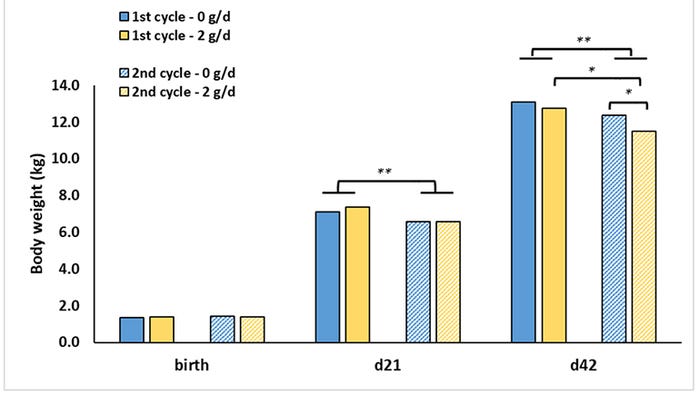Diets supplemented with oregano oil show minimal impact in sows and litters
Objective of this study was to investigate the impact of oregano oil supplementation across multiple parities on sow reproductive performance and offspring growth through the initial post-wean period.
September 7, 2017

By Molly Renken, Robert Thaler, Jeffrey Clapper and Crystal Levesque, South Dakota State University Department of Animal Science
Plant extracts (or phytogenics) are non-nutritive feed additives for use in swine rations. In sows, dietary inclusion of oregano oil pre-farrowing and during lactation increased feed intake, farrowing rate and piglets born alive per litter and decreased sow mortality and piglet stillborns.
Most of the current information is based on single parity studies yet in a practical setting the nutritional strategy is applied over successive parities and in some cases the potential impact of a given nutritional strategy may not be observed in a single parity. Further, evaluation of nutritional strategies in lactation often concludes at weaning but nutrient intake in lactation can impact pig performance in the post-wean period. The objective of this study was to investigate the impact of oregano oil supplementation across multiple parities on sow reproductive performance and offspring growth through the initial post-wean period.
Study design
A total of 48 sows (16 gilts, 32 multiparous sows) were assigned to either an oregano oil supplemented (2 grams per head per day provided as a top dress) or a non-supplemented group from breeding through weaning across two reproductive cycles. Assessment of sow performance included bodyweight and backfat thickness (breeding, Day 110 of gestation, Day 1 of lactation and at weaning), birthing interval farrowing duration and lactation feed intake. A sample of colostrum was collected at birth and a milk sample at was collected at Day 17 of lactation milk. Piglets were weighed weekly from birth to 42 days of age. To intensify social-related weaning stress litters were weaned at 21 days of age into groups of eight naïve pigs (i.e. no more than one piglet per litter in a given pen). All offspring received the same post-wean diets.
Results
Impact of oregano oil supplementation on sow reproductive performance
There was no effect of oregano oil supplementation on sow weight or backfat in gestation or lactation or on gestation length (115.6 ± 0.3 days) in either parity (Table 1). Sows were heavier and lost more weight in lactation in Parity 2 in part due to lower lactation feed intake. There was no effect of oregano oil supplementation on born alive and stillborns, but tended to reduce the incidence of mummies in Parity 2. Farrowing duration was longer in Parity 2 regardless of sow diet which is likely reflective of the larger litter sizes in comparison to Parity 1.

Table 1: Effect of oregano oil supplementation in gestation and lactation across two reproductive cycles on sow reproductive performance.
Impact of maternal oregano oil supplementation on offspring performance in the suckling and weaning phase
Birth weight was similar in both reproductive cycles (Figure 1). However, growth performance was reduced in the subsequent parity such that offspring body weight was lower at both weaning (21 days of age) and trial completion (42 days of age). There was little effect of oregano oil supplementation on offspring growth in the suckling phase, regardless of reproductive cycle, as evidenced by no difference in body weight at birth or weaning.
However, there was an interaction between supplementation and reproductive cycle in the weaning phase such that there was no effect of oregano oil supplementation on Day 42 body weight. Whereas, in the second reproductive cycle pigs from non-supplemented sows had greater daily gains in the post-wean period resulting in heavier pigs at Day 42.

Figure 1: The effect of maternal oregano oil supplementation on offspring body weight from birth to 42 days of age.
Conclusion
Supplementation of sow diets with oregano oil had minimal impact on sow and litter performance regardless of length of feeding (i.e. across parities). The reduced offspring performance in the second reproductive cycle demonstrates the importance of sow lactation feed intake on offspring growth both in the suckling and early post-wean period.
In the case of this study, the lower second parity lactation feed intake was likely reflective of season because Parity 2 lactation occurred during the summer months.
You May Also Like



